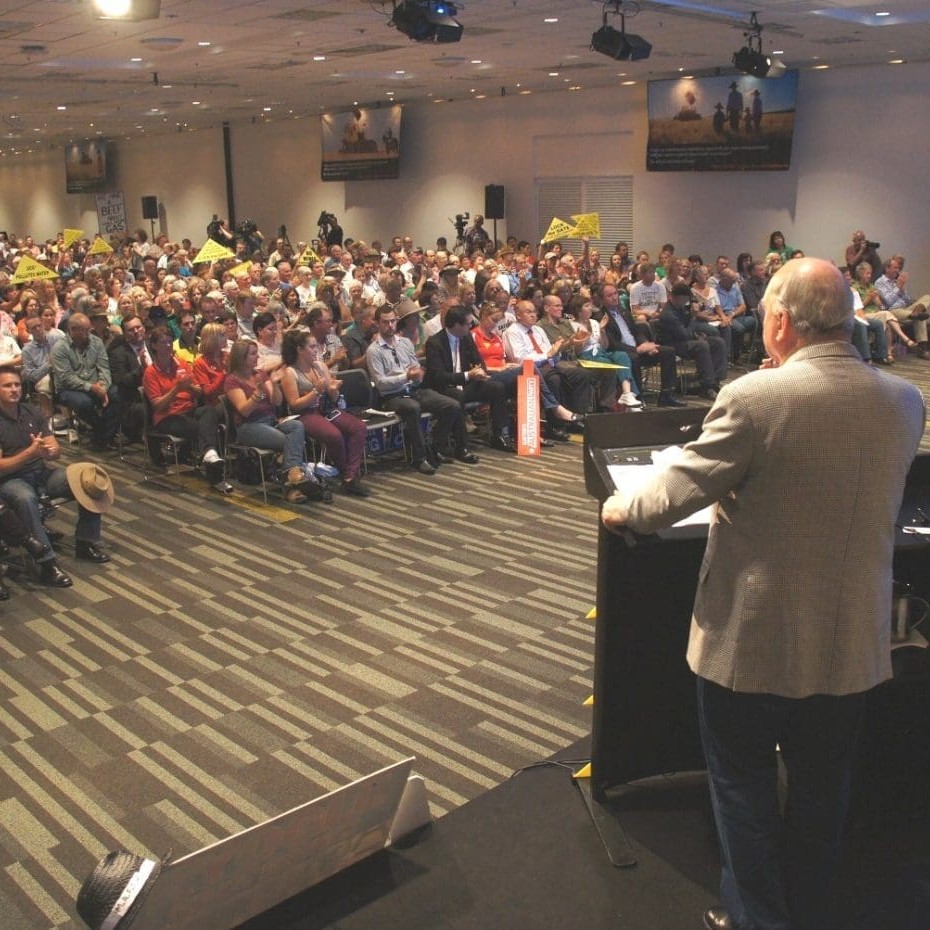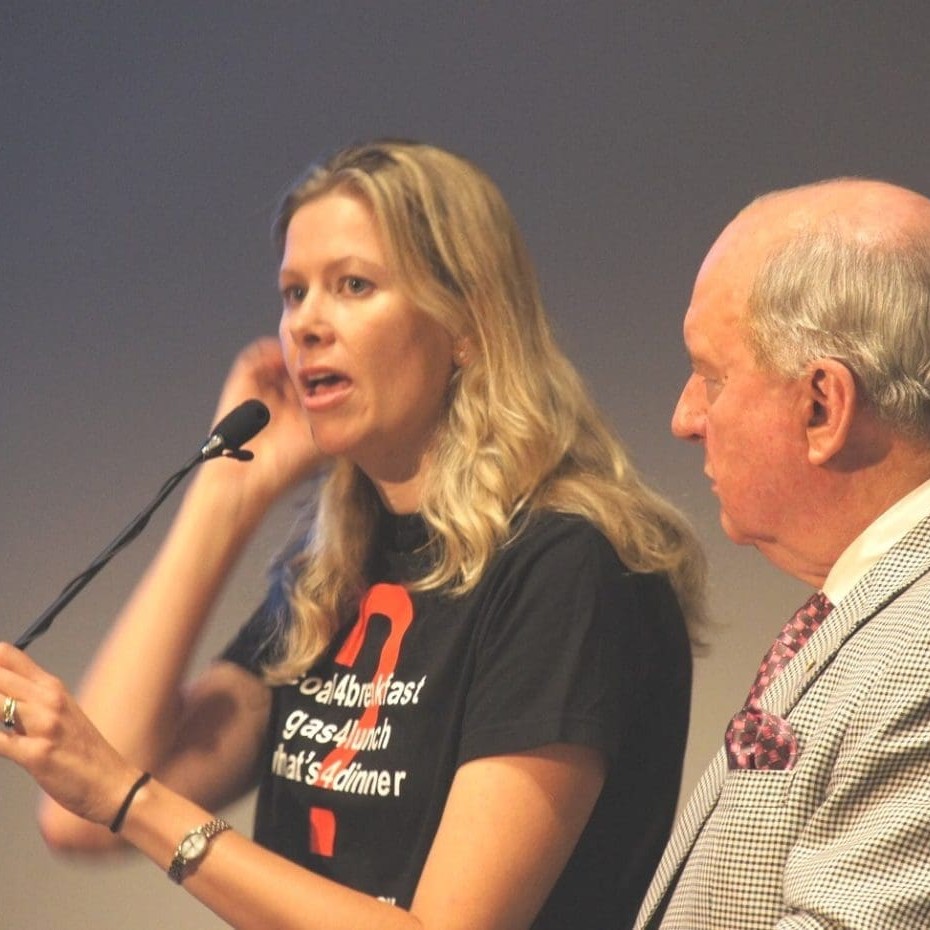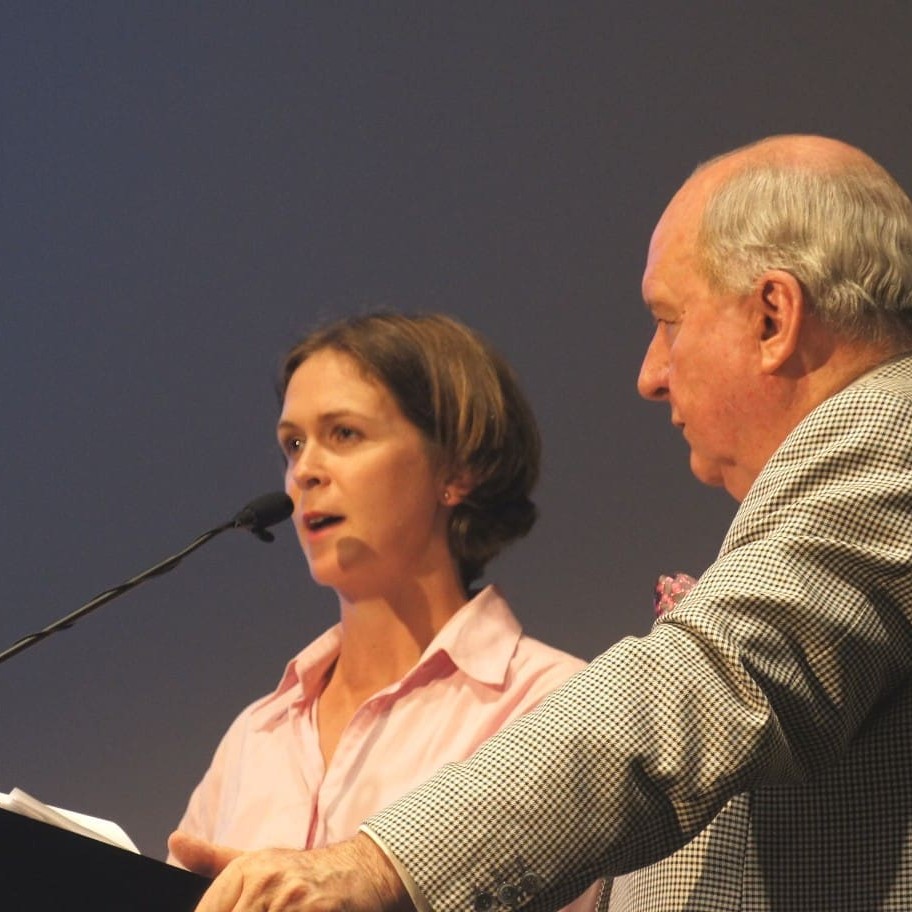 More than 1100 angry protesters converged on Brisbane yesterday for a vigorous and public engagement over the impact of CSG and coal mining activity on their lives and the 80 percent of Queensland under potential challenge from mine development.
More than 1100 angry protesters converged on Brisbane yesterday for a vigorous and public engagement over the impact of CSG and coal mining activity on their lives and the 80 percent of Queensland under potential challenge from mine development.
In one of the biggest CSG gatherings yet seen in Brisbane, protesters vented their spleen at CSG and open cut coal miners, as well as State and Federal Governments for allowing miners to progress their developments at breakneck pace, without due concern for local people or the environment.
Busloads of farmers from across Queensland and NSW were joined by a loose alliance of townsfolk living in small rural communities directly affected by mining activity, city-based environmentalists, minor party politicians and others.
A food security forum at Brisbane’s Convention Centre was followed by a march on Parliament House where protesters threw their hats down as a symbolic bushman’s gesture that they were up for a fight.
The group condemned the lack of action or support over the issue from either side of major party politics over what they see as high risk of contamination of underground aquifers and destruction of valuable farming and grazing land.
Farmer Lisa Leatherbarrow, from the Kerry Valley in the Scenic Rim district south of Brisbane, said farmers wanted city folk to listen to their concerns.
"Vote against the major parties, I say," she said. “Coal seam gas is the most important issue facing this State, and they don't want to talk about it."
Katter's Australian Party and the Queensland Greens have called for a 12-month moratorium on CSG and extensive research into its impact on water and soil. Members of the two minor parties joined protesters in Brisbane for the forum, while both major parties declined to attend.
"We’re talking about the destruction of prime agricultural land," radio shock-jock and forum chairman Alan Jones told the gathering.
"It’s about the potential contamination and exhaustion of water supplies. If that is not an issue at the Queensland election then we are big trouble," he said.
Mr Jones successfully whipped the crowd into a frenzy, saying it cost farmers a lot to take a day off to protest, but it had to be done because Premier Anna Bligh and Opposition Leader Campbell Newman were ignoring them.
He mocked the Queensland Premier’s claim that the social benefits from coal and CSG mining would be distributed among all Queenslanders, and every child at school would get a $4000 ‘scholarship’.
“That represents a bribe to the families of Queensland. I’m saying to Queenslanders, your food security is at risk, as is the safety of your water supply,” Mr Jones said.
“Don’t think that just because you don’t live at Chinchilla or Dalby or Miles that you are not exposed to the damaging impact of CSG mining. Arrow Energy was fracking only 100 metres from the Logan River, supplying water to Brisbane, Ipswich and Beaudesert.”
“These people are now on top of prime residential areas and nobody’s stopping them.”
A procession of female speakers delivered emotional and at times heart-wrenching accounts of the impact that mining had had on their lives in terms of anxiety, ill-health and physical distress caused by noise, dust and permanent light being emitted by nearby gas or coal extraction.
 Cecil Plains grain and cotton farmer Ruth Armstrong described her family’s farm as highly productive floodplain farming country, underpinned by the most important underground aquifer in the State, which among other things provided the family’s drinking water supply.
Cecil Plains grain and cotton farmer Ruth Armstrong described her family’s farm as highly productive floodplain farming country, underpinned by the most important underground aquifer in the State, which among other things provided the family’s drinking water supply.
“Unfortunately we’re also sitting on one of the largest gas reserves in the State as well.
"Arrow Energy has tenure under our community, and has every intention of coming and getting that gas. Unfortunately my State Government also has every intention of letting them do that,” she said.
“On an average week I now spend 20 to 40 hours a week dealing with issues associated with CSG.”
“That comes at a massive social, personal and emotional cost to me and my family, and my community. Key, active people in our community have been taken away from their day to day activity to fight something that they feel powerless against, in the hope of trying to salvage something close to what we previously had.”
Mr Jones quoted a Bligh Government document, ‘Tips for landholders negotiating agreements with resource companies,’ issued in November last year which he said stated: “Regardless of how you feel about the activities taking place on your land, you’re encouraged to develop a courteous and cooperative approach towards the resources company.” The document warned how costly, stressful and time-consuming going to court would be.
“In other words, fall over and let them do their bidding. Well, it’s not going to happen,” Mr Jones said.
“There is 4.1pct of land in this state that is designated prime agricultural cropping and grazing land. On that land we say gates will be locked.”
 Another speaker, Dr Tanya Plant, a young mother from the eastern Darling Downs, lives 2km from a coal mine, and 600m from its processing plant.
Another speaker, Dr Tanya Plant, a young mother from the eastern Darling Downs, lives 2km from a coal mine, and 600m from its processing plant.
“Unless local people actually complain to DERM, then no amount of noise or dust is considered too much,” she said.
“We had to push to DERM to do some monitoring and act after the mine was found to be in breach of their environmental conditions. It puts the whole responsibility on local citizens who are already under stress, can’t sleep at night because of the noise and light, coughing and choking because of the particulate matter, to push DERM, at their absolute discretion, to do some monitoring and take action to ensure we have an environment we can actually live in.”
“We have had a major battle in just gaining access to the mine’s own data about its dust and other environmental impacts.”
Dr Plant said her family and neighbours had been battling the mine development since 2001.
“We heard there might be a mine developed next door, and we wanted to find out about the environmental impact, as none of us had loved next to a coalmine before. They wouldn’t tell us, so we had to go to court to try to find out. We lost and had costs against us.”
“Everyone said how great it would be for the district, and everything would be right. It’s turned out to be worse than we could have possibly imagined.
“I’d like the Government to set in place through the environmental authority standards that mean that the mines can’t be any worse in terms of dust generation than what the state health standards are.
“Instead what they have done is written to the environmental authority saying even if you meet the far more lenient thresholds, it doesn’t matter how many really fine particles you are exposed to, as it is not considered a breach of conditions, even if local residents complain to DERM.”
“I keep hearing from Government, the Minister and the Premier about the rigorous environmental assessment process, but see no evidence of it,” Dr Plant said.
“Our land has come through generations of my family, and I feel I am just a custodian of it for future generations. But the stress is showing: none of us are as healthy as we should be. I don’t know how much of that is physical impact, or psychological stress from four years in court fighting over a railway line going through our property. I don’t know at what point people say, I just can’t take it any more – I’m out of here.”
Alan Jones said he had approached Queensland Opposition Leader Campbell Newman over whether he was prepared to stop miners who were holding landholders who were bought-out to confidentiality agreements, but had been unable to get a commitment.
“I just find it impossible to believe that any Australian hearing these stories wouldn’t think we have a very serious problem in our hands. The Government has just sold itself out. Senator Bill Heffernan as part of the all-party inquiry was horrified by what he found out, but what has he done about it? Nothing, because they all want the money mining offers.”
“This is totalitarian behaviour of the worst possible kind, and how could anyone listening to these stories not argue that there is something seriously wrong. It’s a shameful situation where under the Mining Act, a mining company can march in with greater powers than the landholders themselves,” Mr Jones said.
“People say, but the mining company has to negotiate. But when the farmer says get out of here, the process goes to mediation, where the miners have all the capital to finance a legal challenge, and the farmer has none. The imbalance is extraordinary, and utterly unequal.”
A procession of other speakers raised health issues including constant nose-bleeds and headaches in young children, which they attributed to the environmental impacts of nearby mining activity.
Debbie Orr, a member of a small rural community near Tara, provided an account of the disturbance to her family, with heavy vehicles passing by until midnight on a nightly basis, and the constant noise made by drilling.
Kate Lloyd, from a property south of Chinchilla, said her property so far had 16 CSG gas wells on it, with another 50 to come. There were a total of 165 wells on or within a half kilometre radius of her property, and five workers camps each with 1000 men within 10km, plus two major processing facilities within 10km.
“It is just never ending, and a very different environment from what we are used to. Local landholders are just saying their land has been industrialised to the point where they can no longer viably run agricultural enterprises. They have essentially been forced off their land.”
“That’s in direct conflict with the claim that agriculture can co-exist with mining,” Alan Jones said.
